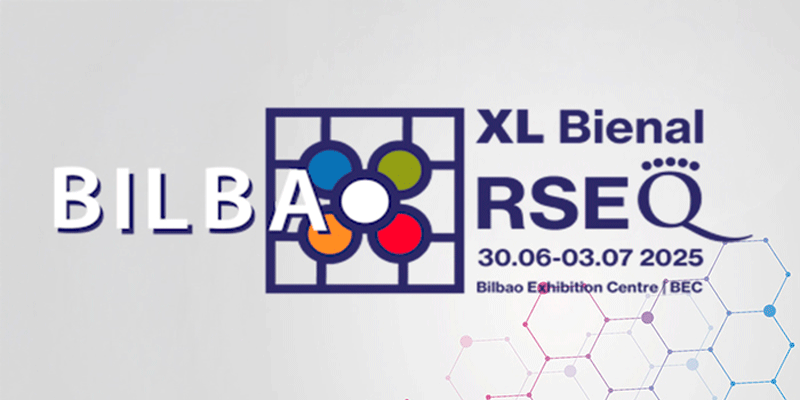
2025/06/24
The 40th Conference of the Royal Spanish Society of Chemistry to showcase cutting-edge research in modern chemistry in Bilbao
The Bilbao Exhibition Centre (BEC) will host, from June 30th to July 3rd, more than a thousand professionals and researchers at this discussion forum, which will present advances in all areas of Chemistry on an international scale.
Jesús Jiménez-Barbero, scientific director of CIC bioGUNE, chairs the organizing committee of the most important scientific event in Southern Europe in this field.
The 40th Conference of the Royal Spanish Society of Chemistry (RSEQ) will gather more than a thousand professionals at the Bilbao Exhibition Centre (BEC) from June 30th to July 3rd. Participants will delve into research being carried out by the scientific community, both nationally and internationally, across all fields of Chemistry. As a central science, this discussion forum will showcase research at the intersection of chemistry and other disciplines, ranging from mathematics, physics, and materials science to life sciences.
This biennial conference is the most important event organized by the RSEQ, an institution dedicated to promoting, developing, and disseminating the discipline of chemistry, both in its fundamental scientific aspects and in its applications, throughout Spain.
The conference’s organizing committee is chaired by Jesús Jiménez Barbero, scientific director of CIC bioGUNE, the committee also includes leading researchers from CIC bioGUNE itself, Ikerbasque, the University of the Basque Country (EHU), CIC biomaGUNE, Atlas Molecular Pharma, and FAES Farma.
Over the course of four days, the conference will feature talks and presentations by both national and international speakers, including prominent researchers and experts in various areas of chemistry, such as synthetic chemistry, organometallic chemistry for sustainable solutions, the development of new materials, chemical biology, and the role of carbohydrates in molecular recognition, among others. There will also be presentations on chemistry education and heritage conservation.
Some of the most notable speakers include Bert Meijer (Eindhoven University of Technology), renowned for his research on functional materials and supramolecular chemistry; José Luis Mascareñas (CIQUS–University of Santiago de Compostela), an expert in metal-catalyzed processes within living cells; Helma Wennemers (ETH Zurich), a leading researcher in the molecular design of supramolecular systems; Pedro J. Pérez (University of Huelva), specialized in developing catalytic systems for the valorization of raw materials; Laura L. Kiessling (Massachusetts Institute of Technology), known for her work in chemical biology; Agustí Lledós (Autonomous University of Barcelona), focused on computational chemistry; Rubén Martín (ICIQ–Institute of Chemical Research of Catalonia), recognized for his contributions to organometallic catalysis; and Joseph Wang (University of California San Diego), a pioneer in the development of biosensors.
Essential research to address the challenges of the 21st Century
The conference is structured into 16 symposia that will take place across five parallel sessions. These symposia will offer insights into the most cutting-edge research lines in contemporary chemistry and provide opportunities to discuss the latest advances with internationally renowned scientists. Topics include: “Advances in Organic Synthesis Methodologies,” “Organometallic Chemistry for Sustainable Solutions,” “Chemical Biology and Carbohydrates in Molecular Recognition,” “Computational Chemical Dynamics,” “Sustainable Chemistry Driven by Light and Electrons for Energy Applications in the Digital Age,” “Where Is (Bio)Analytical Chemistry Headed?”, “Advances in Functional Materials,” “Green Chemistry,” “Supramolecular Chemistry: Toward a Biomimetic and Functional Future,” “Teaching, History, and Dissemination of Chemistry,” “Chemistry for the Conservation of Cultural Heritage,” “Molecular Architectures and Innovations in Materials: Advanced Perspectives on Structure–Property Dynamics and Reactivity,” “New Technologies for the Challenges of the Chemical Industry,” “Development of New Methodologies for the Discovery, Characterization, Preparation, Function, and Applications of Natural Products,” “The Chemistry of Emerging Porous Materials,” and “Advanced Synchrotron-Based Characterization Tools for Energy-Relevant Materials.”
“It is clear that research in Chemistry, at the frontiers of knowledge, is essential for tackling the major challenges of the 21st century in areas such as health, energy, sustainability, and food,” explains Jesús Jiménez-Barbero. “We are confident that our researchers, both from the public sector (universities, CSIC, research centers) and the private sector, will find the scientific presentations highly engaging and thought-provoking, sparking valuable discussion.”
About the Royal Spanish Chemical Society (RSEQ)
The Royal Spanish Chemical Society (RSEQ) is a professional association that promotes the advancement of chemistry in Spain. Founded in 1903, society represents chemists from academia, industry, and government. Its mission is to promote the exchange of knowledge and ideas in chemistry and to promote the application of chemistry for the benefit of society.
About CIC bioGUNE
The Centre for Cooperative Research in Biosciences (CIC bioGUNE), member of the Basque Research & Technology Alliance (BRTA), located in the Bizkaia Technology Park, is a biomedical research organization conducting cutting-edge research at the interface between structural, chemical, molecular and cell biology, with a particular focus on generating knowledge on the molecular bases of disease, for use in the development of new diagnostic methods and advanced therapies.
About BRTA
BRTA is an alliance of 4 collaborative research centres (CIC bioGUNE, CIC nanoGUNE, CIC biomaGUNE y CIC energiGUNE) and 13 technology centres (Azterlan, Azti, Ceit, Cidetec, Gaiker, Ideko, Ikerlan, Leartiker, Lortek, Neiker, Tecnalia, Tekniker y Vicomtech) with the main objective of developing advanced technological solutions for the Basque corporate fabric.
With the support of the Basque Government, the SPRI Group and the Provincial Councils of the three territories, the alliance seeks to promote collaboration between the research centres, strengthen the conditions to generate and transfer knowledge to companies, contributing to their competitiveness and outspreading the Basque scientific-technological capacity abroad.
BRTA has a workforce of over 4,000 professionals, executes 22% of the Basque Country's R&D investment, registers an annual turnover of more than 300 million euros and generates 100 European and international patents per year.
See a large version of the first picture





